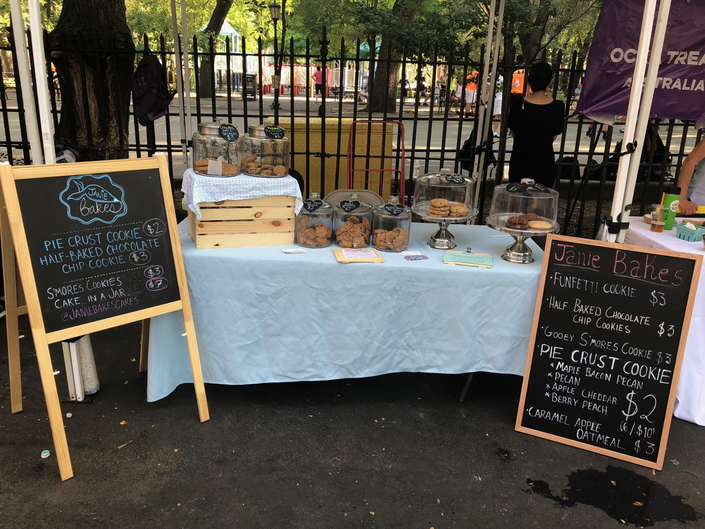By Alison Fox
amNewYork, New York
WWR Article Summary (tl;dr) Beth Goldberg, the director of the New York District Office for the SBA says that while young entrepreneurs have certainly had great role models, she credits the Great Recession with really forcing young people to rethink traditional work paths.
New York
In her early 20s, Janie Deegan was homeless and battling addiction. Now, at 31 years old, Deegan has started her own business.
While Deegan has overcome an extraordinary number of challenges to start and grow her company, Janie’s Life-Changing Baked Goods, she still faces a different type of challenge, one familiar to many of her generational peers: skepticism that someone so young could be a successful entrepreneur.
“I get ‘Is this a bake sale?’ a lot,” she said. “No, this is my sweat, blood and tears. I work 100 hours a week. I think people tend to take me less seriously sometimes unless they get to know me.”
Deegan started her business in 2015, two years after embracing sobriety and rediscovering her love of baking, and now sells her baked goods on her website, at Columbia University’s cafes, and at the Queens Night Market.
“I hadn’t gone to culinary school, I had never worked any sort of real corporate job. I had no idea what it took to build a business — I didn’t even know what being an entrepreneur meant — but I kept building the business and it grew pretty quickly,” she said.
Deegan is one of many millennial entrepreneurs in the city balancing the benefits and challenges of their age. In New York State, there were 21,198 firms owned by people 25- to 34 years old in 2016, according to census data. That is slightly higher than in 2015, when 21,188 were owned by people in that age range.
Beth Goldberg, the director of the New York District Office of the U.S. Small Business Administration, said that while young entrepreneurs have certainly had great role models throughout the years, she credits the Great Recession with really forcing young people to rethink traditional work paths.
“I think the recession changed how people think about work, and they were able to change that because how we work also changed,” she said. “I think the entrepreneur, small business person has always had ingenuity. But I think the spark of this creativity and millennials going right into business could have happened … [because it was] right after the recession.”
Goldberg added the uptick in millennial-owned businesses is noticeable in recent years, helped by a new mentality of living, playing and working all in the same neighborhoods.
“The whole way millennials are working and looking at space … has changed,” she said.
For LaToya M. Smith, the CEO and founder of Brooklyn-based Brass City Media, age has proved to be more of a leg-up than a challenge.
“We’re in between. We came up and had a bird’s-eye view on innovation that was happening … we saw the development of YouTube and Facebook. But I’m still glad that I worked in traditional media before starting my own company,” said Smith, 34, who worked as an editor and on-air correspondent of Black Enterprise magazine before leaving in 2013 to start her own video production and storytelling business the next year.
But it hasn’t always been easy for Smith, and she advocated learning how to “fail forward” and enjoy all the entrepreneurial journey has to offer.
“On the flip side, being young, being a woman, being a person of color, there have been situations where I’ve faced toxic masculinity,” she said. “I’ve also been in meetings in board rooms where the majority of people around me are older, white males, where I have to speak a little louder to be heard. It’s so frustrating.”
Chelsea Brownridge, 34, who founded her dog company Dogspot (formerly known as Dog Parker) in 2015, also said her age has given her certain advantages. Brownridge’s company sets up temperature-controlled, locked dog houses on the sidewalk, and started with two houses in Fort Greene. Now, there are 60 of them in 14 states with plans to further expand.
“I cleared out my savings account and took out debt on credit cards, and I also had a job on the side,” she said. “I think until you actually start a company, you don’t know what all is involved. To be young and inexperienced, a little bit fearless and jumping in … The reality is it’s really, really hard to start a company and maybe if I had known fully what we were getting into, it would have been scarier.”
That was true for Selin Sonmez, 24, whose first location for the Williamsburg-based luggage storage company she co-founded, Knock Knock City, was only a couple blocks away from she lived. Now, the company, which partners with local businesses to allow travelers to store their luggage after checking in or checking out of a hotel or home share, has expanded to 10 cities and has 35 locations in New York alone.
But Sonmez said despite her success, her age still tends to come up — and she sometimes has to wear makeup just to convince people she’s older than she looks.
“There’s a prejudice that young people can’t build up or scale up businesses,” she said. “Especially from the Gen Y crowd, I really got the feeling of disbelief — in a bad way.”
But, like Brownridge, Sonmez said her lack of experience (and that of her co-owner, Niko Georgantas, who is also a millennial) was actually a good thing.
“If we knew all these things that we know now, even a year into the business, it would be hard to start,” she said. “You get this energy that ‘I can do this’ kind of bravery or courage because you don’t know what to expect. That really helped us take this off the ground.”
With Newsday














































































































































































































































































































































































